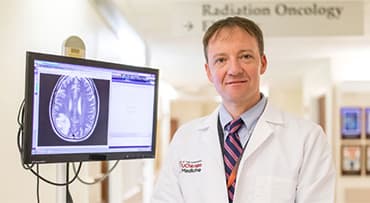Skull Base Tumor Treatments

Cancer
Our cancer experts offer medical, surgical and radiation therapy options to treat the full range of cancer types, and with innovative treatments and leading-edge research, we're attacking cancer from every angle.

Neurosurgery
The experience, dedication to patients, innovative technologies and commitment to research excellence is what makes our neurosurgeons among the first in the region to adopt new, advanced surgical techniques.

Otolaryngology
Dedicated specialists in head and neck surgery, rhinology and otology offer the most innovative treatments for ear, nose and throat (ENT) disorders to meet each patient's needs with personalized care.
Find a Skull Base Tumor Location Near You
Request an Appointment
We are currently experiencing a high volume of inquiries, leading to delayed response times. For faster assistance, please call 1-888-824-0200 to schedule your appointment.
If you have symptoms of an urgent nature, please call your doctor or go to the emergency room immediately.
* Indicates required field
